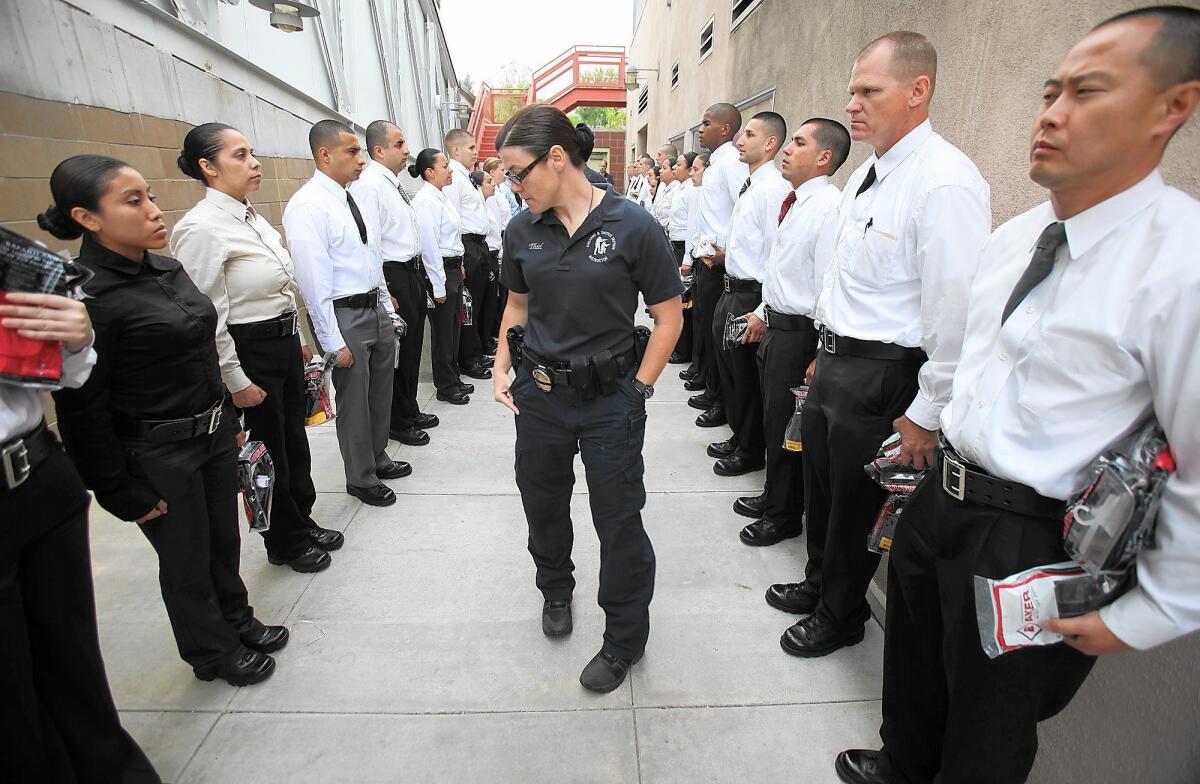LAPD broke labor laws in requiring some officers to repay training costs, court rules

A training instructor at the Los Angeles police academy inspects recruits in their newly issued belts, holsters and duty equipment. The LAPD has required recruits to sign five-year contracts since the mid-1990s, when the department found that some were quitting as early as the day after graduation to work for other departments that did not pay for training.
- Share via
Anthony Alvo joined the Los Angeles Police Department in 1998 at age 21, fresh out of the Marine Corps, envisioning a long career in the department.
But he quickly grew frustrated by a department that he just didn’t like. The atmosphere was toxic, he said, the pay wasn’t great, and there was more money and better conditions to be had elsewhere.
In 2000, after less than two years with the LAPD, he quit to take a higher-paying job with the Chino Police Department. In response, the city of Los Angeles sued him, accusing him of fraud and saying he owed $34,000 for his police training.
Last week, a state appeals court ruled on behalf of Alvo and dozens of other former LAPD officers who were sued by the city, saying an LAPD requirement that officers pay for their training — often tens of thousands of dollars — if they quit within five years of graduating from the academy violates state labor laws.
A three-judge panel of the 4th District Court of Appeal overturned an L.A. County Superior Court ruling in favor of the city, according to an opinion published Wednesday.
The LAPD has required recruits to sign five-year contracts since the mid-1990s, when it found that some were quitting as soon as the day after graduation to work for other departments that did not pay for training.
The contract required officers to reimburse a prorated portion of the cost of training if they voluntarily left and went to work for another law enforcement agency within one year of quitting. The city has sued dozens of former officers in the years since the policy was enacted.
California requires anyone who wants to become a police officer to undergo state-standardized Peace Officer Standards and Training certification, in essence a professional license to work as an officer. Individuals can be required to pay for their own basic POST training, which is offered by some public safety agencies and community colleges.
Local departments, though, can establish their own standards for training that exceed the minimum state requirements. According to the appeals court opinion, the LAPD academy includes 644 hours of POST training and 420 hours of “department-required” training that addresses issues specific to the city, including crime patterns and trends.
The LAPD’s contracts requiring officers to pay for such training that includes requirements beyond basic POST training if they quit violated state labor laws, the court ruled. The court did not rule on whether the city could in the future charge officers for the cost of the POST training portion of their time in the academy.
The city attorney’s office, representing the city and Police Department, is “currently analyzing the decision and reviewing our options,” said spokesman Rob Wilcox, who declined to comment further.
Jon Webster, an attorney representing Alvo and 28 other former LAPD officers sued by the city, said the department’s contract was “like indentured servitude.” He noted that the contract applied only to people who quit to work in other departments and not to people who left to work in other fields.
“In any job, but certainly a job where you have a person responsible for life and death, do you really want to keep a person who doesn’t want to work there?” said Webster, a former Contra Costa County sheriff’s deputy. “If the LAPD was a better place to work, less people would leave. They looked at a method of keeping cops there instead of getting to the root of why cops were leaving.”
Webster said that people who wanted to work for the LAPD had no choice but to sign the contract and that the department required the full academy training even if candidates were already POST-certified. At least one of his clients, he said, had previously put himself through POST training at Allan Hancock College in Lompoc and was still held liable for the full LAPD training.
On Friday, Alvo called the appeals court decision “the culmination of a 14-year roller coaster ride.” The 39-year-old father of six, now working as a dispatcher for the San Bernardino County Sheriff’s Department after medically retiring from the Chino department, said he was elated after years spent wondering whether he would still owe tens of thousands of dollars.
“It’s unbelievable how the city of L.A. would go after one of their own for trying to better themselves,” he said. “The city went after me like I was a suspect.”
Twitter: @haileybranson
ALSO:
Three killed when two planes collide near San Diego’s Brown Field
In-custody death of man accused of stealing U.S. flag investigated
Silver Lake street serves as a test run for L.A.’s traffic overhaul
More to Read
Sign up for Essential California
The most important California stories and recommendations in your inbox every morning.
You may occasionally receive promotional content from the Los Angeles Times.











